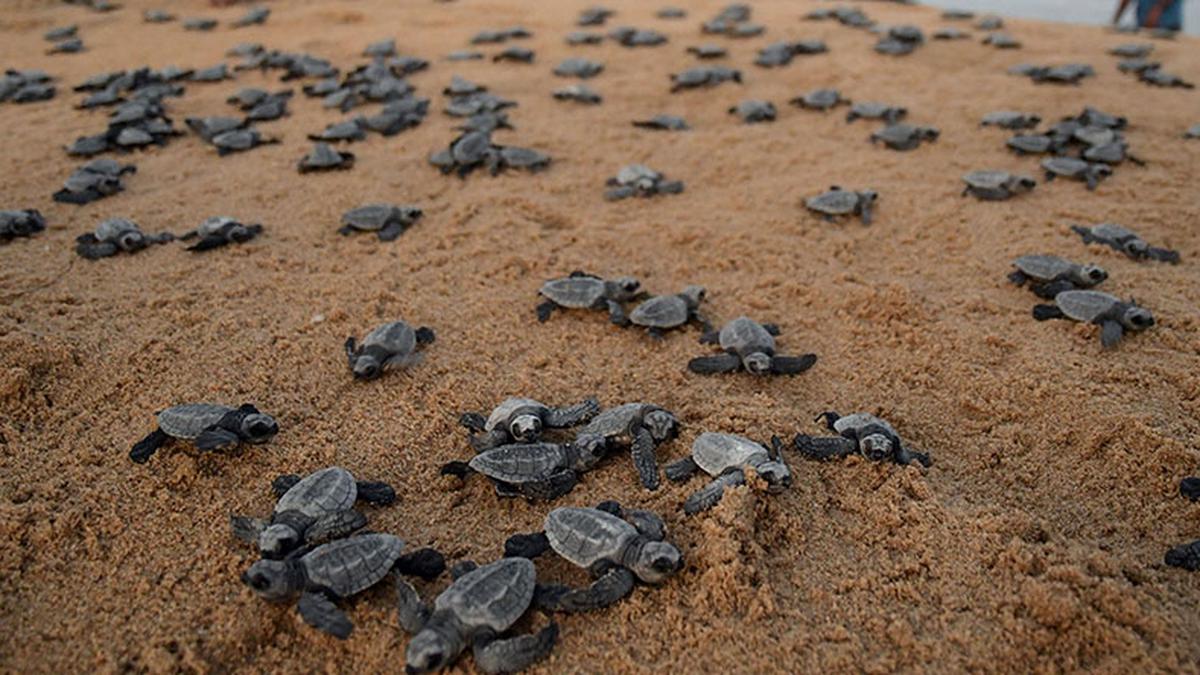
Ennore oil spill unlikely to have adverse effects on Olive Ridley turtles, say officials
The Hindu
Oil spill unlikely to affect Olive Ridley turtles in Chennai, Forest Department reports.
The oil spill in Ennore following flooding during Cyclone Michaung earlier this month will most likely not have any negative impact on Olive Ridley turtles, even as they are set to begin their annual nesting along the coast of Chennai in January, said Forest Department officials.
The Environment, Climate Change and Forests Department issued an order on December 12 forming a special task force to inspect the areas affected by the spill and report any adverse impact on turtles and their nesting areas. The report is expected to be submitted to the government soon.
Srinivas R. Reddy, Chief Wildlife Warden, told The Hindu that as the spillage occurred mainly in the Ennore estuary and the oil did not spread much into the sea, there would be no repercussions of the spill on turtles. Moreover, the sea near Ennore has groynes and the turtles come up only to sandy beaches, he said. “The issue is only for fishes, other aquatic species and birds, and mangroves,“ he added.
According to E. Prasanth, Wildlife Warden, Chennai, who is part of the five-member task force, the five-week gap between the oil spill — which occurred on December 4 — and the start of the nesting season in January will ensure close to nil effects on Olive Ridleys’ nesting habitat.
Although the nesting on the shores of Pulicat to Kovalam beaches begin in January, the turtles start migrating to North Tamil Nadu coast and Andhra Pradesh at the end of September, said Supraja Dharini, chairperson, TREE Foundation. However, there are chances that the cyclonic storm could have disturbed their migration pattern.
Following Cyclone Ockhi in 2017, there was a drop in the number of Olive Ridley nests, Ms. Dharini said, adding that the actual effects of Cyclone Michaung and the oil spill could be ascertained as the nesting season progresses.

“Writing, in general, is a very solitary process,” says Yauvanika Chopra, Associate Director at The New India Foundation (NIF), which, earlier this year, announced the 12th edition of its NIF Book Fellowships for research and scholarship about Indian history after Independence. While authors, in general, are built for it, it can still get very lonely, says Chopra, pointing out that the fellowship’s community support is as valuable as the monetary benefits it offers. “There is a solid community of NIF fellows, trustees, language experts, jury members, all of whom are incredibly competent,” she says. “They really help make authors feel supported from manuscript to publication, so you never feel like you’re struggling through isolation.”

Several principals of government and private schools in Delhi on Tuesday said the Directorate of Education (DoE) circular from a day earlier, directing schools to conduct classes in ‘hybrid’ mode, had caused confusion regarding day-to-day operations as they did not know how many students would return to school from Wednesday and how would teachers instruct in two modes — online and in person — at once. The DoE circular on Monday had also stated that the option to “exercise online mode of education, wherever available, shall vest with the students and their guardians”. Several schoolteachers also expressed confusion regarding the DoE order. A government schoolteacher said he was unsure of how to cope with the resumption of physical classes, given that the order directing government offices to ensure that 50% of the employees work from home is still in place. On Monday, the Commission for Air Quality Management in the National Capital Region and Adjoining Areas (CAQM) had, on the orders of the Supreme Court, directed schools in Delhi-NCR to shift classes to the hybrid mode, following which the DoE had issued the circular. The court had urged the Centre’s pollution watchdog to consider restarting physical classes due to many students missing out on the mid-day meals and lacking the necessary means to attend classes online. The CAQM had, on November 20, asked schools in Delhi-NCR to shift to the online mode of teaching.









